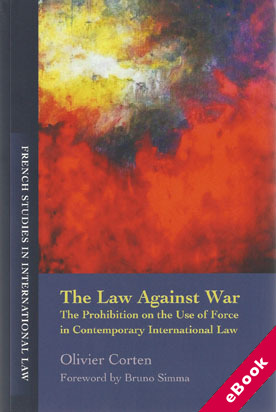
The device(s) you use to access the eBook content must be authorized with an Adobe ID before you download the product otherwise it will fail to register correctly.
For further information see https://www.wildy.com/ebook-formats
Once the order is confirmed an automated e-mail will be sent to you to allow you to download the eBook.
All eBooks are supplied firm sale and cannot be returned. If you believe there is a fault with your eBook then contact us on ebooks@wildy.com and we will help in resolving the issue. This does not affect your statutory rights.
This new book presents an examination of the non-use of force in contemporary international law. Some authors, especially in recent years, have claimed that this field is undergoing an important metamorphosis as a result, in particular, of the requirements of the "war against terror".
More specifically, some authors consider that the systematic prohibition laid down in the Charter of the United Nations (1945) should be made more flexible in the current context of international relations, allowing further development of new concepts such as "humanitarian intervention" and "pre-emptive war", or providing for the possibility of presumptive authorization by the Security Council in certain exceptional circumstances.
The author of this highly original work suggests that if any notable changes can be observed, especially in the past two decades, state practice shows that the Charter system is still based on a true 'jus contra bellum' and not on the 'jus ad bellum' characterizing previous periods. In this sense, as the title of the book suggests, "law against war" is not only a literal translation of the latin expression, but evokes at the same time the spirit of a rule which remains undoubtedly one of the bases of public international law.